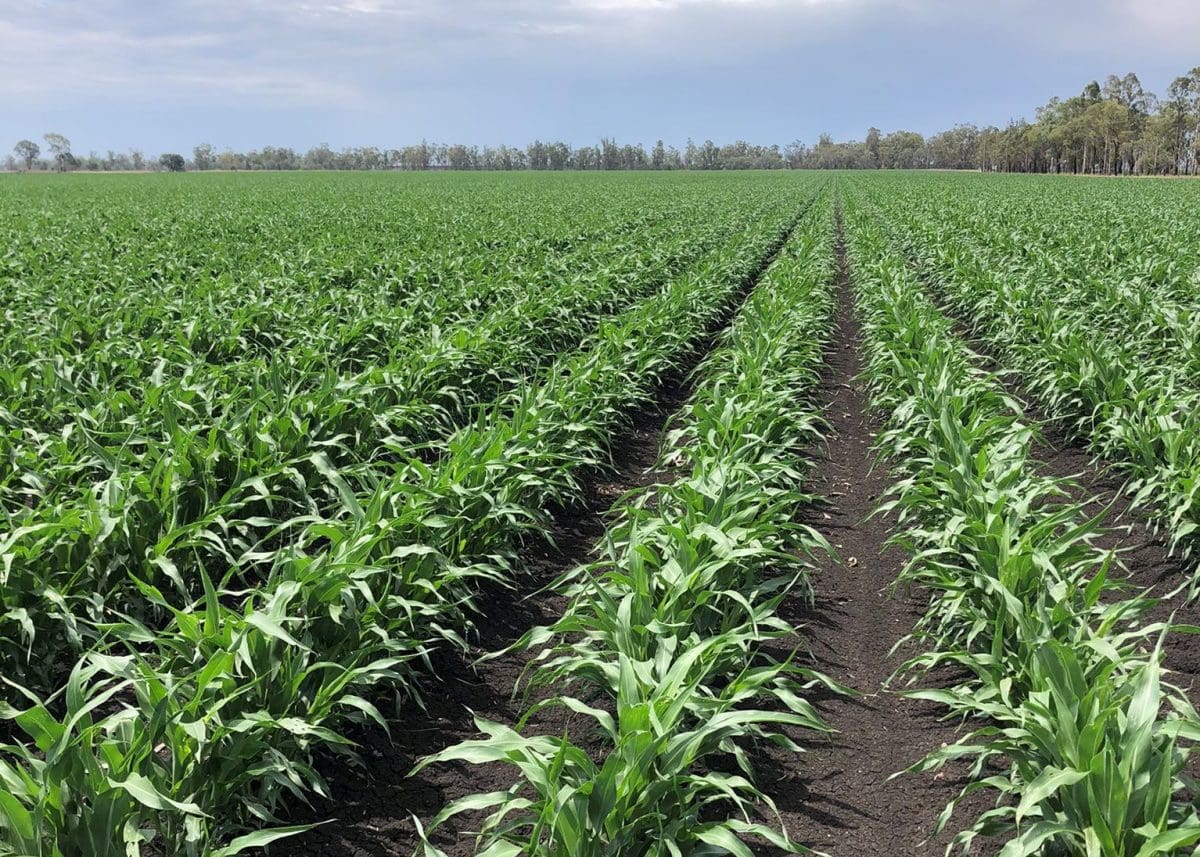
Sorghum crops on the Darling Downs have had patchy rain and extreme and relentless heat in the past week, and need soaking rain this month to preserve yield potential. Photo: Lachlan Nass
SAUDI Arabia on feed barley and China on sorghum were the volume buyers of Australian coarse grains in October, according to the latest export data from the Australian Bureau of Statistics (ABS).
Shipments of malting barley, feed barley and sorghum all dropped in October from the previous month to reflect the run-down in the export surplus, with barley reflecting the usual annual slump ahead of new crop.
Feed barley destined for Saudi Arabia, with a single 66,000t cargo, accounted for 61pc of October exports, which at a total of 108,411t was down 20pc from the September figure.
Japan was the biggest buyer of Australian malting barley in October, taking 30,800 tonnes of the 37,838t total, which represents a 35-per-cent drop from the September figure.
Sorghum exports at 39,113t fell 10pc from October, despite sales to China hitting a high for the year.
Australian sorghum is used in China for stockfeed, and also for production of the baijiu spirit.
It may face added competition in that market from Mexico, which in October signed an agreement with China on phytosanitary protocols that will allow it to sell sorghum to China for human consumption.
Trade sources have said the volume of Australia’s sorghum exports is likely to dip from this month until February to reflect limited stocks of the grain following the small crop harvested in New South Wales and Queensland this year.
Southern Queensland’s week of hot days and nights, around 10 degrees Celsius above average, has robbed some production potential from the crop in the ground which will hit the market in March-April.
Northern NSW will start harvesting sorghum from late January, but its area has been limited by the massive area of winter crop which was still in the ground at sorghum-planting time.
Central Queensland (CQ) is Australia’s other major sorghum-growing area and, like southern Queensland, is in the grip of drought.
CQ does not typically plant sorghum until January, and most of its growers will need at least 100 millimetres of rain by then to plant a sorghum crop with reasonable yield prospects.
In its latest Australian crop report released last week, ABARES forecast Australia would harvest 1.7 million tonnes (Mt) of sorghum next year, comprising 438,000t from 140,000 hectares in NSW and 1.274Mt from 450,000ha in Queensland.
Given current dry conditions in Queensland, its area, yield and production estimates all look to be on the high side.
| MALTING | August | September | October | Total |
| China | 32200 | 33878 | 0 | 66078 |
| Japan | 0 | 1008 | 30800 | 31808 |
| New Zealand | 487 | 243 | 487 | 1217 |
| Singapore | 0 | 39 | 528 | 567 |
| Taiwan | 0 | 507 | 0 | 507 |
| Thailand | 1140 | 1276 | 2828 | 5244 |
| Vietnam | 23595 | 21404 | 3195 | 48195 |
| TONNES | 57422 | 58355 | 37838 | 153615 |
Table 1: Australian malting barley exports for August, September and October 2020. Source: ABS
| FEED | August | September | October | Total |
| Bahrain | 0 | 44 | 0 | 44 |
| China | 0 | 1108 | 0 | 1108 |
| Hong Kong | 24 | 0 | 0 | 24 |
| Japan | 117259 | 85841 | 500 | 203600 |
| Macau | 0 | 5 | 0 | 5 |
| Malaysia | 0 | 368 | 0 | 368 |
| New Caledonia | 401 | 0 | 399 | 801 |
| New Zealand | 0 | 4630 | 0 | 4630 |
| Papua New Guinea | 0 | 0 | 260 | 260 |
| Philippines | 2878 | 2188 | 398 | 5464 |
| Qatar | 19869 | 0 | 0 | 19869 |
| Saudi Arabia | 0 | 0 | 66000 | 66000 |
| Singapore | 3 | 3 | 0 | 5 |
| South Korea | 105 | 520 | 408 | 1032 |
| Taiwan | 3800 | 2226 | 1275 | 7301 |
| Thailand | 31509 | 32852 | 32353 | 96715 |
| United Arab Emirates | 7184 | 804 | 234 | 8222 |
| Vietnam | 4388 | 5349 | 6585 | 16321 |
| TONNES | 187420 | 135938 | 108411 | 431769 |
Table 2: Australian feed barley exports for August, September and October 2020. Source: ABS
| SORGHUM | August | September | October | Total |
| China | 21422 | 19336 | 35689 | 76447 |
| Japan | 172 | 21 | 64 | 257 |
| Kenya | 9 | 22000 | 0 | 22009 |
| Malaysia | 24 | 0 | 23 | 47 |
| Philippines | 3993 | 1379 | 3137 | 8509 |
| Saudi Arabia | 48 | 144 | 0 | 192 |
| Taiwan | 499 | 599 | 200 | 1298 |
| TONNES | 26167 | 43478 | 39113 | 108758 |
Table 3: Australian sorghum exports for August, September and October 2020. Source: ABS

HAVE YOUR SAY